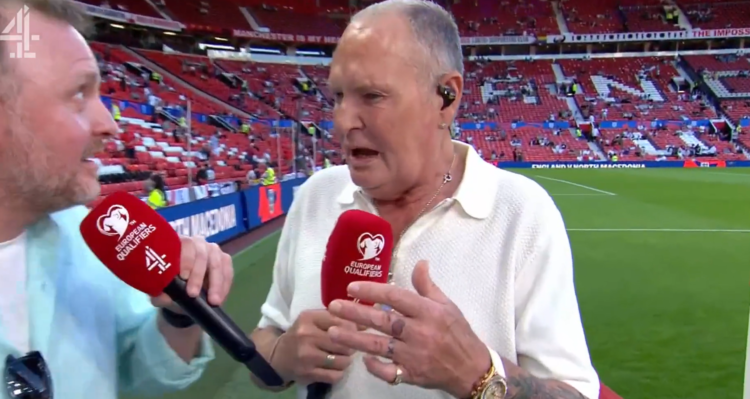By David Young-
Channel 4 has come under fire after showing a live interview with Paul Gascoigne who was said to be seen ‘shaking’ during the broadcast.
Fans were critical of Channel 4 for broadcasting an interview with Paul Gascoigne ahead of England’s game against North Macedonia on Monday night.
The Three Lions legend was present for the Euro 2024 qualifier at Old Trafford, which saw England produce a remarkable 7-0 win.
However, the feature of Gazza, now a shadow of himself as an alcoholic, got viewers angry.
The former England soccer star looked in a state with his right hand shaking during the interview, sparking repulsion and criticism from viewers.
Gascoigne, 56, was renowned for his football talent and is regarded as one of England’s greatest players, but has struggled with alcoholism throughout his life.
Attempts to rehabilitate him have failed again and again, and he regularly features at various events, sometimes to give talks , maintaining some relevance that way.
However, there are concerns that the former star is being exploited at every opportunity, with people prepared to cash in on his fame at every opportunity, especially now that his physical and mental health has deteriorated badly.
Gazza also recently took part in a television contest and selected as the winner of the Channel 4 show, which was fronted by Danny Dyer. He was chosen for the top prize, as the other celebrities rushed to congratulate him on his success. All the stars were kept in the dark for several days – with Scarlett Moffatt, Chris McCausland, Donna Preston, Chloe Burrows, Max George and Nicola Adams all left standing.
Talking about national boss Gareth Southgate, he joked: “I’m not being funny, I scored my goal [at Euro 96] and ended up in rehab. You missed your [penalty in the semi-final shoot-out] and got the England manager’s job and a 30 grand Pizza Hut advert!”
Speaking about his win, Paul said he is a “better person” following his time in the dark.
“People always question my mental strength but my success on this series proves that I am strong. I was nervous going in there but having got this far on the series made me the happiest man around. I’m so happy. It’s unbelievable,” he said.
“I’ve got my smile back. I’m a better person. I got electrocuted and got shot with a cannonball in the bollocks. I f***ing fell backwards. I thought I was 50 foot up in the air and I went through all that. So to come out the other side and to be smiling, is such an amazing achievement and to win it is like the most unbelievable feeling, it’s just fantastic.”
He added: “I’m really honoured to have won but in my eyes, all my fellow Scared of the Dark celebrities are winners. They all did really well and I really enjoyed spending those eight days getting to know them in the dark. We worked so well as a team.”
Exploitation Concerns
Channel 4’s decision to air footage of Paul Gascoigne shaking raises concerns about the exploitation of vulnerable individuals for the sake of sensationalism. Gascoigne’s struggles with alcoholism and mental health issues are well-documented, and broadcasting his distressing moments could be seen as a violation of his privacy and dignity. Some viewers argue that the network prioritized shock value and viewership ratings over the well-being and sensitivity towards Gascoigne’s condition.
Responsible Journalism and Duty of Care
Responsible journalism continues to be a problem in the media landscape Media, with broadcasters not always knowing where to the draw the line.
Media organizations have an established responsibility to exercise ethical judgment and a duty of care towards individuals featured in their programs. By showcasing the shaking of a visibly unwell Gascoigne, Channel 4 may have failed to consider the potential negative impact on his well-being. The broadcast could exacerbate his struggles with alcoholism and contribute to public stigmatization of addiction, ultimately hindering his recovery process.
The portrayal of individuals battling mental health issues demands a careful and responsible approach. Airing footage of a vulnerable individual in distress without providing appropriate context or resources can perpetuate harmful stereotypes and further marginalize those facing similar challenges. Channel 4’s decision to broadcast Gascoigne’s shaking raises questions about the network’s sensitivity and commitment to promoting mental health awareness and support.
The public’s strong negative reaction and subsequent complaints regarding Channel 4’s feature on Paul Gascoigne’s shaking highlight the significant impact such content can have on viewers. Outraged individuals voiced concerns over the potential harm caused to Gascoigne and the perpetuation of stigma surrounding addiction and mental health issues. The volume and nature of these complaints emphasize the importance of responsible media practices and the need for broadcasters to consider the potential consequences of their content.
There are growing calls for greater ethical guidelines and standards to guide broadcasters in making responsible decisions that prioritize the welfare and dignity of individuals involved.
Instances of this nature underscore the importance of regulatory bodies and industry standards in the media sector. Regulators, such as Ofcom in the UK, play a crucial role in ensuring broadcasters adhere to ethical guidelines, protect vulnerable individuals, and maintain public trust.




